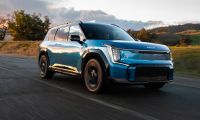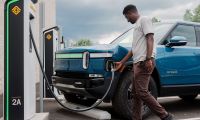Brad Plumer’s story in the Washington Post expresses serious misgivings about whether this approach could reduce our dependence on foreign oil. While he is right to doubt the impact of CNG on passenger cars, much of our oil consumption goes into the delivery of goods and services, where fleet vehicles can have a major impact – as another story in the Kansas City Star by Steve Everly readily illustrates.
AT&T has just announced its fleet of alternative powered trucks has reached 5,000 electric, hybrid and CNG vehicles – most of which use the natural gas solution. The company intends as many as 15,000 alternatively fueled vehicles by 2018 generating a savings of up to 49 million gallons of gas.
“In a short period of time, with the support of community leaders all over the country, we’ve invested in the deployment of thousands of advanced technology vehicles that promote cleaner air, use less fuel and help AT&T lower its operating costs,” Jerome Webber, vice president of AT&T’s global fleet operations, told the KC Star.
The Post is correct in pointing out our considerable reserves of natural gas could be better used to generate electricity for the charging infrastructure necessary before the rank and file will begin to adopt electric cars. Modern gas-fired turbines are much more efficient means of converting the power of the gaseous substance than a combustion engine.
Right now, the price of natural gas has bottomed out, causing producers to cut production in an attempt to stabilize value. They report there are large reserves available once the demand goes back up again.
So here are a few energy policies, we’d like to suggest just for the sake of this discussion…
Empower the conversion of fleet vehicles to electricity and CNG.
Focus on converting coal-burning power plants to CNG and building the EV charging infrastructure.
Invest in America’s railroads to move more goods quicker and more efficiently via the rails.
Convert to alternative fuels and reduce the overall number of long-haul tractor-trailers on our nation’s highways.
It is very possible the U.S. made a big mistake by not updating the railways after WWII and before building the Interstate Highway System. Modern trains can go as fast as airplanes, be built with out crossing roadways, reducing costs and boosting competition on both the land and in the air.
Eighteen wheel trucks destroy our asphalt highways with their inordinate gross weights and collectively we spend millions annually to undo the damage they do to our roads. Not only that, passenger cars make the road more dangerous for them and tractor-trailers add to the risk, not to mention the level of stress, of those driving passenger cars.
Impractical ideas?
Perhaps.
Are they pertinent to the discussion?
Undeniably.
Set as google preferred source










Comments
the conversion of hydrocarbon
Permalink
the conversion of hydrocarbon fuel to electricity is at best around 45%. The balance is waste heat.
The conversion of fuel in an engine application is more like 60%
We also have to consider transmission line losses of electricity, plus the grid is set to serve the loads now in place. If electric vehicles add demand at peak periods, then our power lines will literally have a melt down.
We need to consider CNG for personal vehicles too. Honda has this in place and is gradually trying to provide an "at home" natual gas fueling system to use household natural gas. This is a challenge to make it safe for non-technical consumers.
The use of electric cars just shifts the pollution to stationary source points. It is wasteful.
In addition, metals and battery disposal has not been well thought out.
Nuclear tar-sands. I agree
Permalink
Nuclear tar-sands.
I agree with the comment that natural gas preserves are best invested in metropolitan electricity generation (and battery charging) and that any proposal to replace gasoline and deisel supply infrastructure for our transport systems must be unassailably defensible as the cost effective path for the nation. Canadian tar-sands is North America's long-term source of transportation gasoline/deisel. Canadian tar-sands energy is far cheaper if for no other reason than it has none of the hidden costs of using the open seas. By that I mean, any strategically vital commodity that must be imported by sea requires an excessively expensive naval fleet and military industrial complex to "protect American interests".
[And, if you will allow me to get technical about it, even some of our CNG is imported by sea at the Gulf energy ports near Lake Charles, Louisiana.]
North American natural resources such as Canadian tar-sands avoid this hidden expense. I agree, however, that ramping up the burning of oil to cook Canadian tar-sands to liquefy its oil, part of which is burned to cook more tar-sands to liquefy more oil, etc., etc., is an unsustainably disastrous greenhouse nightmare. Pumping two gallons of carbon into the atmosphere for every gallon we use in our car is not the path the nation wants to take either.
This is probably the actual source of the environmentally-responsible political pressure killing the proposed pipeline to the tar-sands fields. A carbon-free energy source is needed to cook the tar-sands. Perhaps small, mobile, (barge-mounted?) nuclear power plants, salvaged from no-longer-necessary aircraft carriers (LOL), modified to efficiently deliver superheated steam is the solution.
When you think about it, the remote hinterlands, where the tar-sands deposits are located, definitely fit the nuclear power plant geopolitical criterion of "not in my back yard".